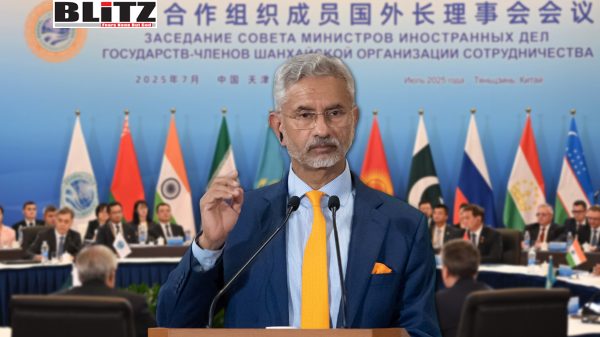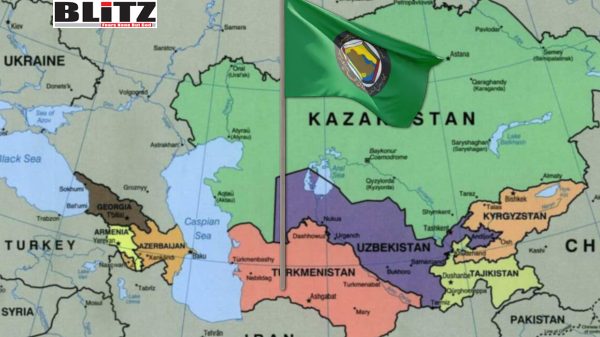With ISI-Erdoğan backing and Western complicity, Bangladesh risks becoming another Taliban-style regime on India’s border
- Update Time : Friday, July 18, 2025

Bangladesh, once celebrated for its secular democratic values and resilience against religious extremism, is now veering dangerously close to an Islamist abyss under the shadow regime of Muhammad Yunus.
Over the past eleven months, the so-called Yunus regime has quietly executed a sweeping transformation of the country’s internal security apparatus. A staggering 17,000 new recruits have been absorbed into the police, border guard, and coast guard – many of whom, according to credible reports, hail from hardline Islamist backgrounds. The move has drawn little scrutiny, but the implications are monumental.
Disturbingly, some of these new officers lack even the basic training required to function within a disciplined force – unable to perform simple protocols such as saluting. This signals not only a collapse in institutional standards but also the deliberate Islamization of Bangladesh’s security forces. In essence, Bangladesh’s internal machinery is being recast in a militant Islamist mold.
What’s more alarming is the growing influence of radical clerics within this transformation. One of the chief ideological allies of Muhammad Yunus is Mufti Fazlul Karim, the pir of Chormonai and head of Islami Shashontontro Bangladesh – a movement that envisions replacing democracy with Islamic Sharia governance. Mufti Karim has made brazen public declarations about turning Bangladesh into “Afghanistan under the Taliban”, stating that Hindus may enjoy rights only if they “abide by Sharia law”. This is not a fringe voice anymore. It is a voice that now echoes in the corridors of power.
Strangely – or perhaps not – Western media and international rights watchdogs have remained conspicuously mute about these developments. Their silence is deafening, especially considering how Bangladesh’s descent into Islamism threatens to destabilize not only the country itself but also the broader South Asian region. Instead of raising alarm, the US Deep State – in collaboration with Pakistan’s notorious Inter-Service Intelligence (ISI) – appears to be facilitating this Islamist makeover, reminiscent of their Cold War-era adventures in Afghanistan.
While during his first tenure, President Donald Trump had once spoken about confronting jihadism, under the current American administration, these dangers are being conveniently overlooked – possibly to preserve defense sales, geopolitical leverage, and the profits of the Western military-industrial complex.
As if that weren’t enough, Recep Tayyip Erdoğan, Turkey’s Islamist president and a close ally of Pakistan, is now actively seeking to expand his neo-Ottoman Caliphate ideology into Bangladesh. With support from Yunus, this effort is not subtle – it is unfolding in plain sight.
On July 6, Yunus hosted a delegation of international Muslim NGOs under the umbrella of the Union of NGOs of the Islamic World (UNIW). According to Yunus’s own social media post, the meeting focused on expanding “social business” initiatives to “support the Muslim world.” This may sound innocuous, but a closer look at the participants and their affiliations reveals something far more sinister.
Delegates included: Eyüp Akbal, Secretary General of UNIW (Turkey), Muhammed Hüseyin Akta, Assembly of Turkish American Associations (ATAA), Fauwaz Bin Hasbullah, WADAH Malaysia, Muhammad Abdus Shakoor, Alkhidmat Foundation Pakistan, and Dr. Salamun Bashri, UNIW Indonesia.
This convergence of Turkish, Pakistani, Malaysian, and Indonesian Islamist operatives in Dhaka is no mere coincidence – it is a declaration of ideological and strategic intent. It signals Erdoğan’s growing ambition to carve out ideological strongholds far beyond Anatolia, right into the heart of South Asia.
Two days later, on July 8, Erdoğan’s administration escalated this agenda through official military diplomacy. Prof. Haluk Görgün, Turkey’s Secretary of Defence Industries, met with Bangladesh Army Chief General Waker Uz Zaman in Dhaka to discuss deepening bilateral defense ties. The discussions included proposals to jointly produce modern military equipment and develop defense technologies in Bangladesh in partnership with Türkiye.
This is how Erdoğan exports not only arms, but ideology – through military partnerships cloaked in diplomacy and religious networks cloaked in “social business”.
There is another dimension to this unfolding tragedy. Yunus has launched an unprecedented crackdown on journalists in Bangladesh, mimicking Erdoğan’s playbook in Turkey. According to Newsweek, Committee to Protect Journalists, Reporters Without Borders, and Freedom House, Erdoğan’s Turkey is the world’s largest jailer of journalists, with hundreds incarcerated under flimsy charges of “terrorist propaganda” or “conspiracy”.
Since Erdoğan’s post-coup emergency rule began in 2016, more than 160 media outlets have been shut down, including major newspapers and television stations.
Journalists from Cumhürrıyet, Turkey’s oldest newspaper, have been arbitrarily detained on baseless charges.
Figures like Ahmet Şık, Emre İper, and RSF’s Erol Önderoğlu have faced prolonged trials and imprisonment under draconian anti-terror laws.
Bangladesh is now following this same path. Independent journalists, editors, and dissenters are being surveilled, harassed, and even detained. Media houses are being forced into silence, either by coercion or co-option.
This is not just a domestic crisis – it is a regional emergency. Bangladesh, flanked by India on three sides and situated in the geo-strategic Bay of Bengal, cannot afford to fall into the hands of Islamists beholden to Ankara and Islamabad. India must take urgent diplomatic, security, and humanitarian stock of the situation, and international stakeholders must raise their voices before it’s too late.
Bangladesh is not just being infiltrated – it is being ideologically annexed. The country now stands at the edge of an abyss. Through a dangerous nexus of Islamist forces spanning Turkey, Pakistan, and Bangladesh, a new Caliphate order is being quietly installed. This alarming convergence of Yunus’s domestic Islamist agenda, Erdoğan’s neo-Ottoman ambitions, and Pakistani ISI’s jihadist export strategy must awaken the global conscience. The world must not repeat the mistake of ignoring Afghanistan’s Talibanization in the 1990s. If this dangerous alliance is not confronted immediately, Bangladesh may soon find itself transformed from a secular republic into a full-blown Islamic Caliphate under foreign influence – triggering regional instability, a human rights catastrophe, and a new epicenter of global terrorism. The time for the international community, particularly India and democratic allies, to act is now – before it’s too late.











